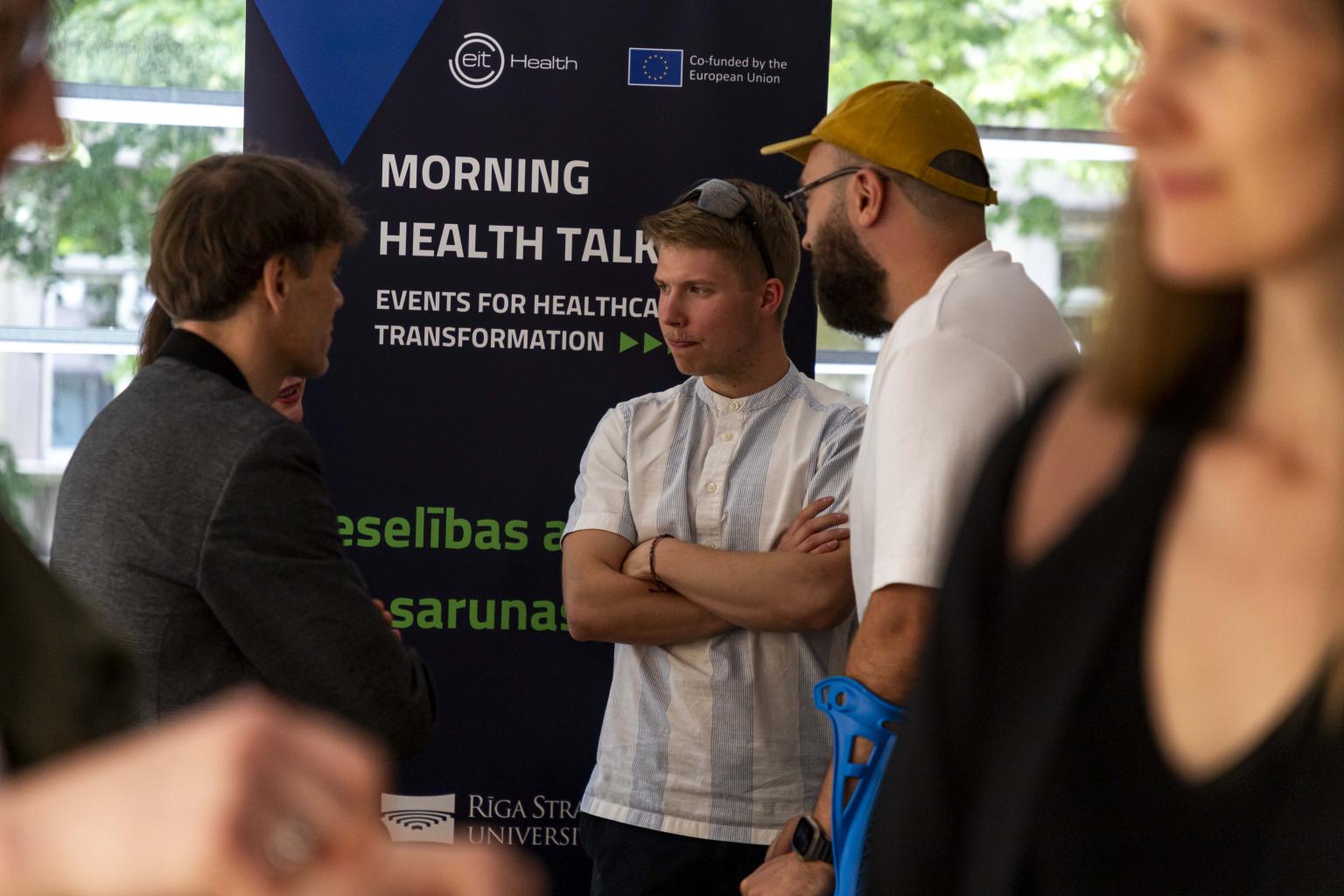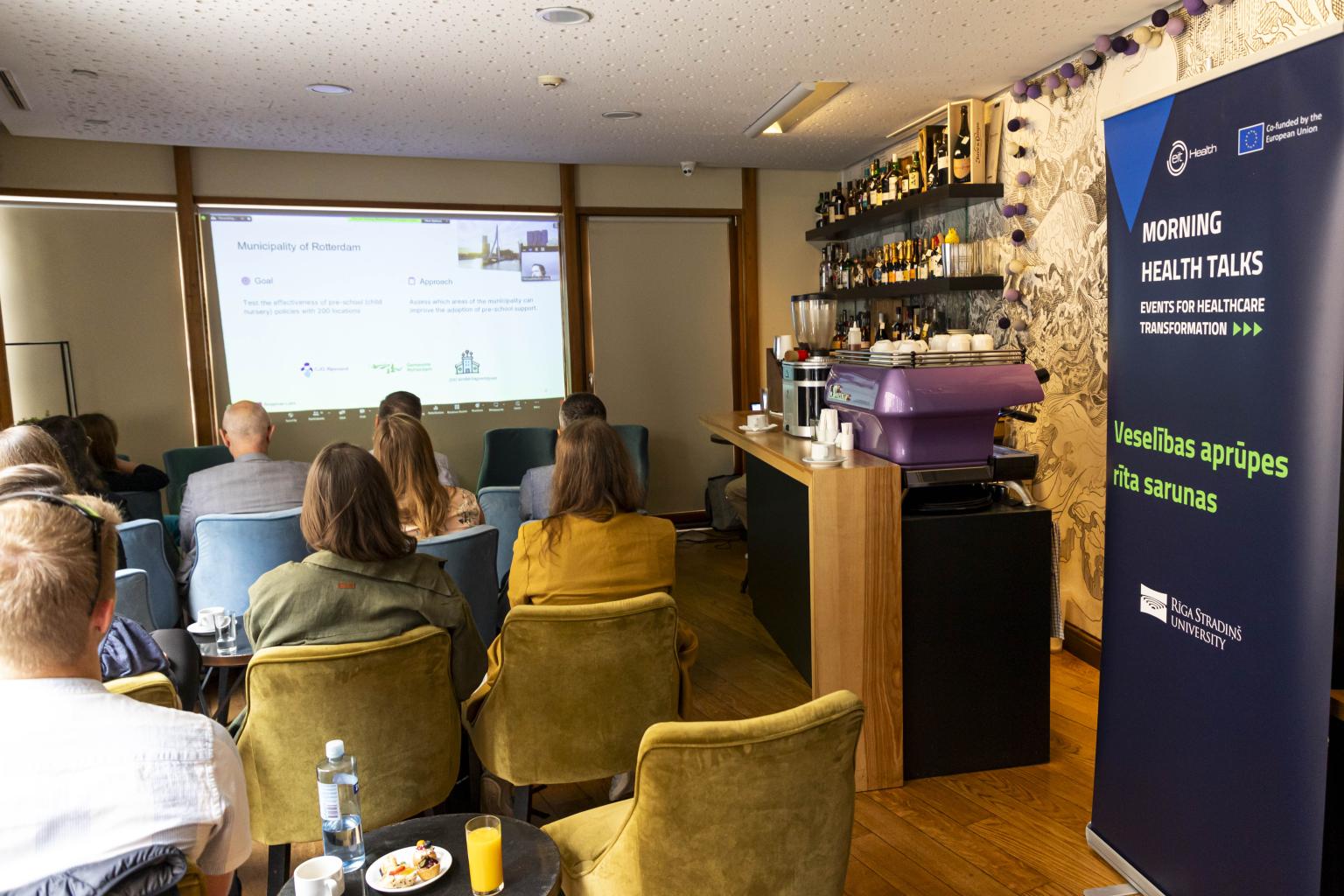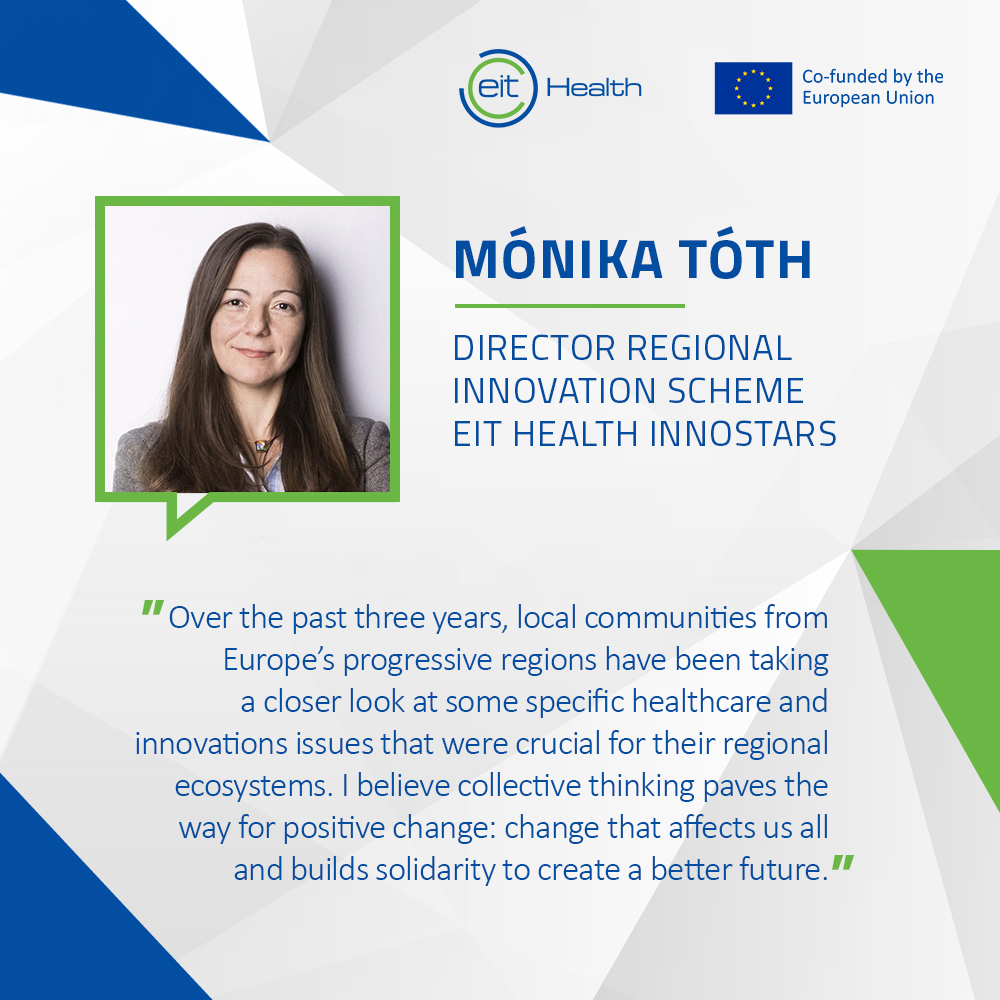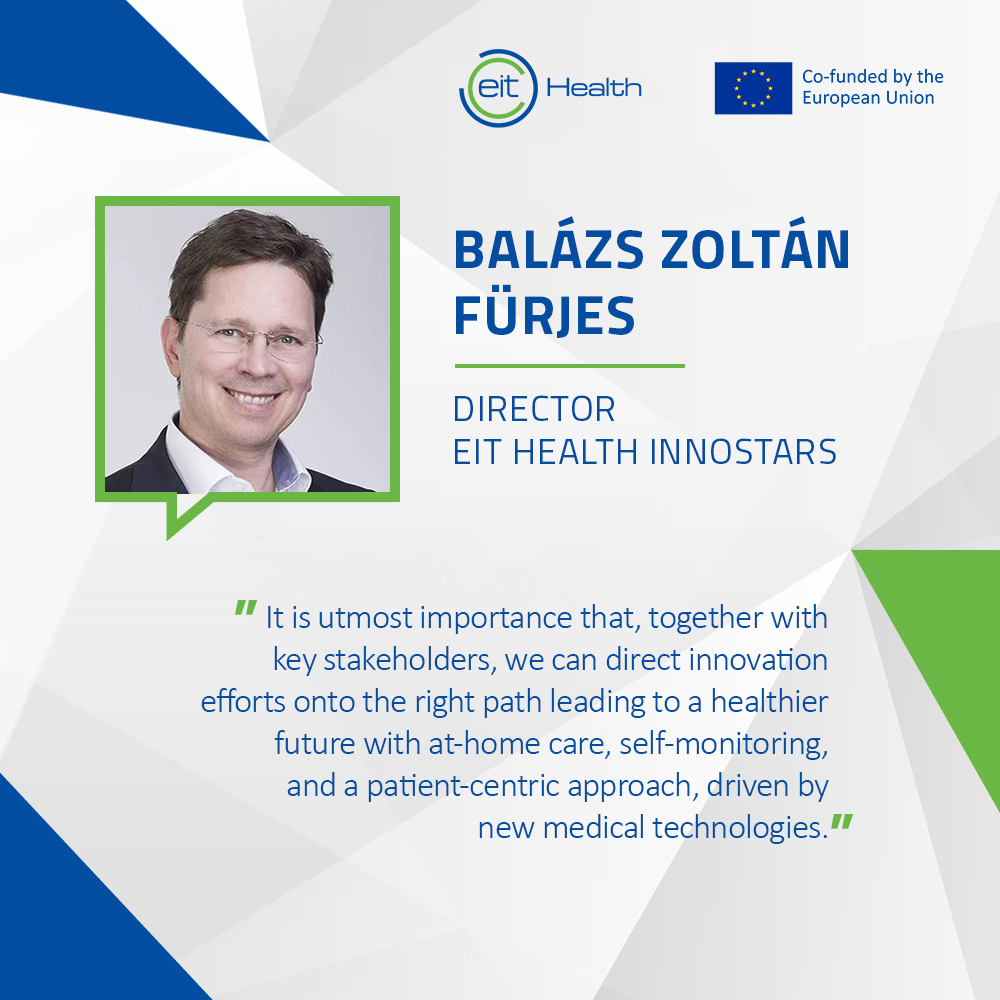EIT Health Morning Health Talks focus on data sharing in open innovation alliances
The first EIT Health Morning Health Talks of the year took place on 6 June 2024. The event was centred on the theme of Open Innovation Journeys: Collaborative Pathways, Alliances and Networks, getting an insight into open innovation alliances and how these alliances can contribute to the secondary usage of healthcare data: data sharing in open innovation.

The discussions that create a network environment for healthcare thinkers and doers
Using healthcare data for innovations and service improvements
Local Latvian healthcare industry had the opportunity to learn about the experience of the Netherlands at the event organised by the EIT Health RIS Hub in Latvia (European Institute of Innovation and Technology Health Knowledge and Innovation Community Regional Innovation Scheme). Roseman Labs, a high-tech software company, representative Michael Häusler-Leutgeb in his online presentation highlighted the challenges of data sharing in healthcare due to data -fragmentation and varying data standards. Ensuring data privacy while extracting valuable insights from combined datasets is a significant barrier. Presentation showed real world application examples of Roseman Labs platform that encrypts sensitive data at the source, enabling analysis while maintaining privacy and GDPR compliance. It allows linking of data sets from multiple patients across different healthcare providers. Thus, facilitates the discovery of new patterns and insights into patient journeys without accessing individual patient data.

Roseman Labs representative Michael Häusler-Leutgeb's online presentation
Access to high-quality data is key to good research and innovation
In Latvia, collaboration and interaction between organisations in healthcare using secondary data is essential. During a multi-stakeholder panel discussion moderated by Emil Syundyukov, co-founder and CEO of Longenesis, and attended by representatives from public administration, healthcare institutions, academic institutions and private laboratories, as well as healthcare companies, participants sought to determine what is needed to make more effective use for research and innovation purposes of data generated by each stakeholder.
Ņikita Trojanskis, Adviser to the Minister of Health on Digitalisation and Artificial Intelligence development, gave an insight into the situation, noting that Latvia has a relatively large amount of digital data and a high level of digital centralization, but it is often unstructured. While various registries are being modernised, such as oncology and laboratory data registries, improving the quality of primary data is a key issue, as standardised and high-quality data are needed. The Ministry of Health will start working on regulations to enhance the quality and accessibility of primary data this summer. As well as, the Ministry of Health has developed legal framework for secondary data use, which will set the conditions for access and cost of data and ensure the protection of patient data.
Ingmārs Kreišmanis, Project Manager at the Science Department of Riga Stradiņš University, explained that currently researchers are faced with legal uncertainties and a lack of infrastructure for processing sensitive data. Latvia's Open Science Strategy could be one solution.
In the longer term, there are also plans to establish a secure data environment in the public administration, managed by the Central Statistical Bureau, that aims to streamline data access for research and innovation. There is also a need to develop a mechanism to certify such new environments, potentially through the Higher Education and Science Information Technology Shared Service Centre (VPC).
Ilona Platonova, Innovation Project Manager at the Children's Clinical University Hospital, pointed out the need for pilot projects to test new data-sharing models before implementing larger scale system. This could help to move things forward more quickly. When it comes to patient engagement, experience shows that patients are generally open to innovations, but there are concerns about possible data leaks and usage. Hospitals are therefore actively working on organizing internal processes and improving data accessibility for researchers.
The necessity for Open Innovation capacity building and activities in several directions were mentioned during discussion: enhancing research capacity in healthcare institutions, particularly for transitioning from basic data collection to active research roles; preparing innovators for clinical environments; supporting researchers in terms of different degrees of digital skills and diverse interests.
It is essential to agree on common priorities
Discussion highlighted the importance of cooperation between institutions, industry players, and different sectors. There was a consensus on the importance of connecting data from various fields, since in the context of healthcare also data related to the economy, education and other aspects, that come from different sources, is relevant for conclusive interpretation of obtained healthcare data.
Therefore, data should be structured and collected in agnostic manner to ensure versatility across different uses. Consequently, collaboration across sectors is essential to overcome the existing challenges and to leverage the full potential of healthcare data.
It is also essential for all stakeholders to be united in the political process, as discussions on data access priorities—whether for researchers, public authorities, or industry — are still ongoing.
Dins Šmits, RSU Vice-Rector for Academic Affairs, noted that one of Latvia's advantages is that many people who are interested in the topic and capable of driving change are already part of this Morning Health Talks discussion (including remote participants). This means that if we truly want it, we can make those changes happen.
Importance of people and resources
Mikus Gavars, member of the board of E. Gulbja laboratorija, highlighted the need for funding as a significant aspect of innovation development. Not much will happen on its own without allocated funding because it often involves additional work hours dedicated to innovation development. This might be the component that is missing in discussions and actions.
It is important for research projects to also provide funding specifically for a data specialist who will work with the data, standardising it, finding and developing appropriate standards.
On the positive side, Latvian researchers are increasingly involved in various European-level research infrastructures. As a result, they gain valuable experience, for example, in the field of personalized medicine. Collaboration is happening, and there is deliberation of how to work with entrepreneurs in the future.
- Agenda
Opening Dins Šmits, Vice-Rector for Academic Affairs, RSU Keynote speech by Roseman Labs in English Michael Häusler-Leutgeb, Roseman Labs Multistakeholder panel discussion in Latvian: Insight into Latvia’s experience Emil Syundyukov, Longenesis CEO and Co-founder; moderator of discussion
Ņikita Trojanskis, Advisor to the Minister for Health on digitalisation and artificial intelligence development
Ingmārs Kreišmanis, Project Manager, Department of Science, RSU
Mikus Gavars, Board Member at E. Gulbja Laboratorija
Ilona Platonova, Innovation Project Manager, Children's Clinical University Hospital
The event is organized by the Latvia Hub of EIT Health - European Institute of Innovation & Technology Health Knowledge and Innovation Community. EIT Health RIS hub in Latvia operates from Rīga Stradiņš University (RSU).
About EIT Health Morning Health Talks
EIT Health Morning Health Talks (MHT) is an invitation-only event series in 13 EIT RIS countries with the purpose of creating an opportunity for high-and middle-level healthcare stakeholders, professionals and decision-makers to network, exchange perspectives and practices over business breakfast. The discussions that create a network environment for healthcare thinkers and doers.
Event Highlights
- Networking opportunities
- Expert insights
- Inspiration and motivation
- Community Engagement
Target Audience
- Business Leaders (MedTech, IT, Biotech)
- Academia (Medical, Pharma, Technical, Economic Universities - Faculty)
- Healthcare Providers (Hospitals, Ambulatory Care, Long-Term Care)
- Research Institutions and Incubators
- Public Administration and Governmental Organizations
- Professional Bodies, Investors, and Start-Ups with at least a proof of concept
Background
Morning Health Talks, part of the EIT Health RIS Programme 2020, fosters local healthcare innovation ecosystems through productive stakeholder discussions, relationships, and collaborative advancements. Morning Health Talks aim to raise awareness of health issues that are important globally but need to be addressed with local stakeholders.





